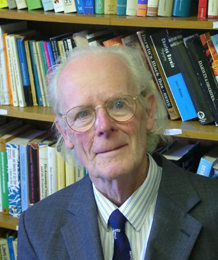
Professor John Maynard Smith passed away peacefully on 19 April, aged 84. His colleagues in the Centre for Study of Evolution (Life Sci) pay tribute here to one of the world's greatest evolutionary biologists .
"Although born in London, JMS spent much of his youth on and around Exmoor, where he became a skilled rider - and naturalist. He was less happy at Eton College, but this was where he developed passions for mathematics and Darwinism.
JMS became a communist while at Cambridge University, but ignored the party line when war broke out in 1939 by attempting to join the army. He was rejected because of his poor eyesight and told to finish his engineering degree, which he then applied to military aircraft design.
After the war, deciding (in his own words) "that aeroplanes were noisy and old-fashioned, he entered University College London, to study zoology". There he studied fruit-fly genetics under J.B.S. Haldane, another apostate Etonian. In 1965, JMS became the founding Dean of the School of Biological Sciences at Sussex.
JMS is perhaps best known among professional biologists for his investigations into The Evolution of Sex (1978) and his application of game theory to biology (Evolution and the Theory of Games, 1982). He made an even wider impact, however, with books such as "my little Penguin", The Theory of Evolution (1958, 1966, 1975, 1993).
In 1985, JMS retired from teaching and administration but certainly not from research. He wrote the highly influential book The Major Transitions in Evolution (1995) with Eörs Szathmáry, and what he called "the birdwatchers' version", aimed at a wider public, The Origins of Life (1999). Another major focus was his work with Noel Smith on the bacterium causing tuberculosis in cattle and badgers.
Unsurprisingly, JMS was showered with honours, including the Darwin Medal in 1986, the Crafoord Prize in 1999 and Kyoto Prize in 2001. The affection he inspired from students was surely just as rewarding.
To our despair, we can no longer directly seek his clear and patient advice. But our memories - and John's prodigious output of publications - will continue to inspire us. Our sympathies go to Sheila, his children and grandchildren."
|

